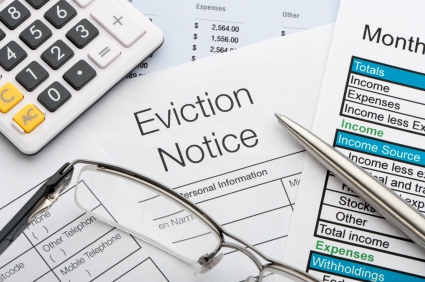If you are facing a possible eviction from your home or apartment, then filing for bankruptcy can stop the eviction process in most circumstances and provide you with some additional time. When you file for bankruptcy, the automatic stay begins, which stops most judicial proceedings from continuing, including an eviction from your home or apartment.
How Long Will I Be Able to Stay in My Apartment or Home?
How long you will be able to stay in your home or apartment will vary depending on local policies and procedures where your bankruptcy case was filed. You may be able to stay in your home anywhere from a few weeks to several months. This answer really depends on how quickly your landlord files a motion in bankruptcy court to allow him permission to proceed with the eviction process. Before your landlord can proceed with the eviction, he must lift the stay by obtaining court permission. In some areas, this matter can be heard relatively quickly, and the order signed in a few weeks, while in other areas, the matter may not be heard until at least 3 weeks. As an example, in Riverside, California a motion to lift stay for an unlawful detainer can usually be heard within a few weeks, and the order signed shortly thereafter.
Will Bankruptcy Stop An Eviction No Matter Where You Are in the Eviction Process?
Not necessarily. There is a specific section in the bankruptcy code that indicates that the stay may not protect you from eviction if the landlord has already obtained a judgment for possession before you filed for bankruptcy. It is very important to be aware of where you are in the eviction process to determine if filing for bankruptcy will stop the process from continuing. In California, before a person is evicted for non-payment of rent, they are given a 3-day notice to pay or quit. After the 3-day period expires, the landlord or owner can seek to evict you by filing an unlawful detainer action in court. You are given 5 days to respond to the unlawful detainer complaint. If you fail to respond to the unlawful detainer, then the landlord or owner will obtain a default judgment. If you file after the default judgment is obtained, then the automatic stay in bankruptcy may no longer assist you.
The relevant section of the bankruptcy code states that the automatic stay does not apply in “of the continuation of any eviction, unlawful detainer action, or similar proceeding by a lessor against a debtor involving residential property in which the debtor resides as a tenant under a lease or rental agreement and with respect to which the lessor has obtained before the date of the filing of the bankruptcy petition, a judgment for possession of such property against the debtor”
Even if a judgment for possession was obtained prior to the filing of your bankruptcy case, some of the sheriff’s departments may refuse to move forward with the eviction process without having the attorney obtain an order lifting the stay. In addition, the automatic stay can apply for at least 30 days after the filing of a bankruptcy case, where you can certify that there are circumstances under state law that would allow you to still cure the amount that you are in default on and you have deposited with the clerk of the court the rent that would be due within that 30 day period.
Filing for bankruptcy is an important decision and should not simply be made on the basis of stopping an eviction. Consult with a local bankruptcy attorney if you are facing an eviction and need debt relief.

